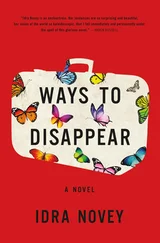“Do you think it was wrong of me to invest that money?”
I don’t know what to say. This is so major, so different. I stretch out a hand and touch his hair. And he lets me.
“Yes. I think it was wrong,” I say in my mildest voice. I smile at him, though he doesn’t see it.
“But I would have gotten the money back when the markets went up, you know. Then I’d have given more back to the school than I borrowed. We could have fixed up the B wing.”
“But it really wasn’t certain that the markets would have gone up, Frederik. It wasn’t a sure thing, was it.”
He doesn’t get angry with me, nor does he start weeping. He listens. The curtains, like in Majorca. It grows a shade darker in the room.
Then he asks, “Do you think Laust is very upset about it?”
“Yes, I think so.”
“Is that why he doesn’t call anymore?”
He pulls the comforter over his head and curls up in a ball, and I can see by his breathing that he’s crying. He’s trying to hide from me; it means something to him that I don’t see his face. Laust and me and the school and all of us; we exist for him again.
I want to lie at his side and cry with him, from sorrow and guilt over what he’s done to his school. And from sorrow and guilt over my own betrayal.
I press myself into his foreign scent, his foreign body. I haven’t been so close to him since he became sick. Perhaps the same images are flooding us both: Saxtorph on the last day of school. The flag waving, the happy children, the staff, and all the teacher friends that we still talk to. Frederik making a speech up on stage, and pulling it off so well that everyone praises him afterward.
And the prison where I visit him: electronic doors slamming, guards behind tiny glass windows, Frederik slumped over when I arrive; him shriveling up and slowly going to pieces.
And him getting better — so that perhaps we take a walk like normal people, perhaps we can have friends to dinner like in the old days.
And Bernard’s lips. His body pressing against mine. He was doing the pressing too. He was kissing.
• • •
Early in the evening, Bernard calls.
“We can’t see each other anymore,” he says.
“What are we going to do about the case then?”
“I’ll help you find a good lawyer.”
I hold my tongue. From what I’ve learned about him in the past two months, I should have known that this was the way it would have to end.
“I’m sorry,” I say.
“There’s nothing you have to apologize for.”
“But can’t we continue to talk on the phone?”
“It won’t work.”
“But just about the best way to support our sons?”
I can hear the stiffness in his voice; each word carefully chosen before he called. As if the least nudge in an unexpected direction might break him.
“I’m sorry, Mia.”
“It would be better for our kids, we really don’t need to—”
“I can’t do it.”
“We were friends,” I say. And now I hear in my voice that we no longer are.
“Yes.”
“I’m going to miss you.”
“What do you want me to say?”
“So now you won’t call me anymore?”
“No.”
“And I shouldn’t call you either?”
“I’m asking you not to.”
My fingers feel stiff as soon as I hang up. I have to stretch and flex them several times, just to verify that I still can. It feels slow, it feels strenuous. My arms and legs; I can hardly move. A jeep in the desert, a jeep that’s driven thousands of miles but whose engine has seized up. It rolls along slowly in neutral, then stops somewhere in the dunes.
Without tears, without expression, without any stops for little tasks on the way, I manage to fight my way up to our bed. I’m going to lie here a long time, I think to myself. I lie down in the same position as Frederik. I’m going to remain here for months, looking at the wall, at that sign on the ceiling.
It’s dark when Thorkild calls. I haven’t slept, haven’t stirred, haven’t gotten up to eat dinner. And Frederik, who in the meantime has gone to the workshop, hasn’t noticed.
Thorkild always sounds serious. I think he was that way before his son became ill, but I’m no longer sure.
“Frederik sounded quite upset on the phone this afternoon,” he says. “I just wanted to hear—”
“Yes, we’re pretty upset,” I say. “The school and everything, it’s just devastating him now.”
“But in a way that’s good, right? A sign that he’s still getting better?”
“Yes, it’s good.”
“Something to celebrate, right?”
“Yes.”
The conversation doesn’t last much longer.
The next day there’s a letter from Bernard’s firm, informing us that we now have a new lawyer by the name of Louise Rambøll. I manage to make it through the school day. I don’t know if my students notice anything wrong with me, but as soon as I’m home I go back to bed.
Frederik is already lying on his side of the mattress. I start to console him but have to stop; I can tell that it’ll only make me bitter, for I need solace as much as he does, and I never get any. We lie under our respective comforters with our backs to each other, the air still; it’s stuffy in here.
I get up, cry, go to bed, cry, take some Tylenol because the roof of my mouth hurts so much from crying, get up, take a shower, cry, go to bed again.
I’m down in the kitchen making a jam sandwich with the cheap jam from the blue plastic bucket I bought for Frederik when I hear laughter out in the street. Through the window I see Niklas and Emilie. She has a sweet way of laughing with a single tone, like the signal call among some pygmies I once saw a documentary about.
They grow quiet as they approach our front door. Will she come in here again after her experience with Frederik? Yes, I can hear them in the hallway. Brave girl.
They mustn’t see me in this state. I slip into the unlit living room, just in case they want to get something from the kitchen, and I sit down in the armchair. My sight adjusts to the darkness of the room, my hearing to the silence.
Some of my friends have told me about their teenagers having sex at home. When we were their age, we too would have sex when our parents were elsewhere in the house, but we were quiet. My friends’ kids aren’t; there are moans and grunts and smacks regardless of who’s nearby. Youngsters have gotten so unself-conscious, though I can’t imagine Niklas being that way.
Have the two of them done it before? Of course they have. Has he done it with other girls? I don’t think so, but what do I know? Are they going to do it tonight? Of course they are.
And you can’t help but see it unfold before your eyes. The smooth young bright faces, the lean bodies, the swelling red-brown genitals pumping away at each other. You can’t help but see their laughing, kissing, and groping, or the quiver of their faces in orgasm.
In the darkness here, I can’t hear a thing. I listen but no, there’s nothing. I’ve got to make sure that Frederik doesn’t try to barge in on them. I have to protect them.
Quickly I tiptoe up the stairs. Outside Niklas’s room, I remain standing a little while, and again I hear Emilie’s laugh — softer now, more of a giggle, while Niklas speaks with a mild adult voice that I’ve never heard before. The voices stop — and then?
I ought to walk away. I hear a light clattering noise in there. What’ll I say if the door opens? My mind goes blank. I should definitely walk away.
The sounds are so muted now as to be almost inaudible — a YouTube clip? Some synthetic-sounding voice? Is that Niklas speaking again? Silence? Breathing? Gasps?
A few steps down the hall, I open the door to Frederik’s workshop. The light here is cold and overwhelming after the darkness of the hallway and the room downstairs. He sits at his desk, bent over some technical diagram. He doesn’t react when I come in; he probably has no idea if Niklas is even home.
Читать дальше



![Ally Carter - [Gallagher Girls 01] I'd Tell You I Love You But Then I'd Have to Kill You](/books/262179/ally-carter-gallagher-girls-01-i-d-tell-you-i-lo-thumb.webp)








